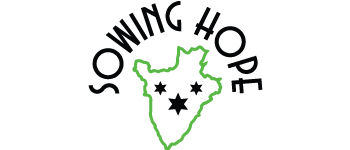The UN has classed Burundi as the 4th poorest country in the world. (https://worldpopulationreview.com/country-rankings/hdi-by-country)
In 2018 when Leslie Boettcher went to Bujumbura, the capital city, it was to give spiritual support to a group of women. What she got, however, was a shock that tore at her heart. As she gave out to those women, God was giving something back: a burden for Burundians, particularly women, who live in very precarious financial situations.
At the seminar where Leslie was teaching, women shared their stories of abandonment and abuse by their husbands. She noticed that Ruth, one of the participants, had brought one of her sons to the meeting. When Leslie remarked that he seemed to be small for his age, Ruth said that when she couldn’t sell items at the market that her children wouldn’t eat—and it happened often. She saw hundreds of people milling around one of the central town squares, hoping to find work.
Struck by the incredible physical poverty of the country she began a conversation with Pastor Boniface who had organized the seminar. Together they began to ask what, if anything, could be done to alleviate some of the sufferings due to the economic situation in the country. Together they came up with the idea of helping women procure chicks, a hen house, and chicken feed that would allow women to have a source of food as well as a means to start a business of raising and selling chickens.
When she returned to the U.S. she started to raise funds for the project and Pastor Boniface was able to help a man and two women, one of them being Ruth, a start-up with chickens. While this was a life-changer for Ruth, the other two did not fare so well partly because they were not trained to know how to care for the animals.
Again, collaborating with Pastor Boniface, they worked together to see what could be done to give people, primarily women, a means to create income. When they hit on the idea of a sewing school, Pastor Boniface was adamant that this was an idea that could begin to lift people out of poverty.
Since readymade clothes are not readily available in Burundi, being able to design and make clothing is a skill that is in high demand. Folks will purchase material and take it to a seamstress or tailor who will make the clothing they want. Children in school need uniforms. Office workers need nice-looking shirts, skirts, and slacks. Everyone needs clothes for special occasions. So, the possibility of starting a grassroots business that could provide for a family while working from home was a huge draw.
The project, titled the Dorcas Association, started slowly with finding a space to rent, obtaining sewing machines, and hiring an instructor. It quickly took off and the demand was high. While the students pay a portion of the costs, the largest contribution comes from funds that are received here in the U.S. and transmitted to Burundi.
Starting in 2018, the school has graduated over 400 students. In 2019 we began to see that graduates were completing the 6-month course but were unable to start a business because they could not afford a sewing machine. Considering this difficulty Sowing Hope decided to take the step of the funding part of the cost of sewing machines so that graduates have the possibility of working toward regular and sustainable income. Currently, with the generous support of friends and a few churches, we subsidize 2/3 of the sewing machine costs.
Students complete three months of training which includes learning how to use a treadle machine, how to make patterns, how to cut cloth as well as the basics of sewing. Then they take another three months to perfect those skills before graduation. Included in every lesson is a devotional, pointing out the hope that comes from faith in Jesus. Not all who participate are Christians and some come from other faiths, but they all receive the same message of God’s redeeming work in Jesus.
Graduation is a big deal. It has typically been a formal occasion as a local official will come to the ceremony and assist with the distribution of certificates. Graduates receive a certificate of completion, a pair of scissors, a measuring tape and if they have been able to come up with the 1/3 needed for it, a sewing machine. Some are not able to find the funds for individual purchases so they will team up with another graduate or two to buy one together.
The impact has been considerable for graduates. One has said that being able to start her own business and employ two other women has changed her life. The biggest attitude which we pick up from participants in the school is hope! They see possibilities for themselves and a future with less poverty and more opportunities.
